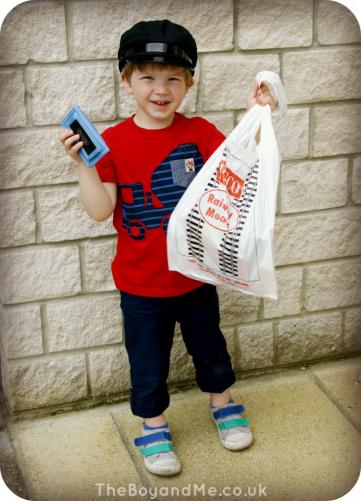Recently I've started to say 'no' to The Boy about certain things. In the past if his ask was realistic then I'd automatically say 'yes' and pay for the trip to bowling or a new little toy, however I've started to realise that he is expecting these to come as normal. And while I don't want him to think we're living on the poverty line, or for him to worry about finances (as I did as a child), I do want him to realise that we need to save up for things.
We've started giving him 50p a week pocket money for helping out around the house, and in order to save for a toy he'd really like. He's actually mentioned a few times recently that he'll be able to buy x, y or z with his pocket money (although I'm not sure he'll be able to afford the trip to Legoland as he hopes!).
Read on to find out more sage advice.
You’re never too young to receive valuable financial advice – at least, that’s according to people in the UK.
Saving and being careful when choosing purchases is the most popular financial advice for people to bestow, recent research from budgeting account provider www.thinkmoney.co.uk has revealed.
If you can’t afford it, don’t buy it
More than a third of Brits advise the spenders of the future to be savvy when it comes to purchases, with 37% citing ‘if you can’t afford it, don’t buy it’ as the most important financial lesson to teach children.
And if you thought that it would be the older generation urging children to save money, you’d be wrong. More than three times as many people aged 18 to 24 (25%) as over-65s (just 7%) said that ‘try to save something each month’ is the most valuable wisdom to impart to children.
What do the children think?
However, a video produced by thinkmoney shows that children have other ideas. Watch ‘Kids and Money’ here to find out what they think.
As you can see, leaving financial decisions in the hands of children perhaps isn’t the wisest idea, with some youngsters estimating the cost of a house at just £1! Guesses as to what their parents earn range from 1p to £5. And it’s clear that the old adage ‘money can’t buy you happiness’ is unlikely to appeal to a child, as if they had all the money in the world they’d choose to buy sweets, chocolate, water pistols and Transformers!
Money lessons for children
As well as ‘if you can’t afford it, don’t buy it’, adults rate ‘always live within your means’ as important advice (23%). Meanwhile, saving every month was cited by 16%, ‘looking after the pennies and the pounds will look after themselves’ by 9%, ‘money can’t buy you happiness’ by 8%, and ‘always try to avoid borrowing money’ by 7%.
All this advice is sound, but when the world is full of endless possibilities and the most important thing you have to worry about is what you’re getting for Christmas, it’s easy to see why children don’t have the same money concerns as adults!
Advice varies according to age group
Interestingly, the advice given out by young people is different to that of older generations. For example, a quarter of those aged 18 to 24 think it’s important that children ‘try and save something each month’, while only 7% of those aged over 65 agree with this. Perhaps this is because they’re already enjoying their pensions and have a different attitude towards the future.
Or perhaps they’ve realised that all the saving they did in their younger days wasn’t as important as living in the moment. The older generation instead favour ‘always live within your means’ as important financial wisdom. This suggests that older people are less likely to borrow money.
Ian Williams of thinkmoney said: "It's funny to see all the ideas that kids come up with about money. It's important to try and show them the value and importance of money from an early age, though, for example by giving them a money box and a small amount of pocket money each week. How you encourage them to use that money is up to you."
In collaboration with thinkmoney


